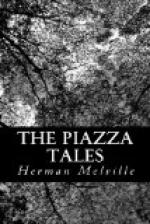But on the magic metal, the magic and metallic stranger never struck but that one stroke, drove but that one nail, served but that one clasp, by which Bannadonna clung to his ambitious life. For, after winding up the creature in the sentry-box, so that, for the present, skipping the intervening hours, it should not emerge till the hour of one, but should then infallibly emerge, and, after deftly oiling the grooves whereon it was to slide, it was surmised that the mechanician must then have hurried to the bell, to give his final touches to its sculpture. True artist, he here became absorbed; and absorption still further intensified, it may be, by his striving to abate that strange look of Una; which, though, before others, he had treated with such unconcern, might not, in secret, have been without its thorn.
And so, for the interval, he was oblivious of his creature; which, not oblivious of him, and true to its creation, and true to its heedful winding up, left its post precisely at the given moment; along its well-oiled route, slid noiselessly towards its mark; and, aiming at the hand of Una, to ring one clangorous note, dully smote the intervening brain of Bannadonna, turned backwards to it; the manacled arms then instantly up-springing to their hovering poise. The falling body clogged the thing’s return; so there it stood, still impending over Bannadonna, as if whispering some post-mortem terror. The chisel lay dropped from the hand, but beside the hand; the oil-flask spilled across the iron track.
In his unhappy end, not unmindful of the rare genius of the mechanician, the republic decreed him a stately funeral. It was resolved that the great bell—the one whose casting had been jeopardized through the timidity of the ill-starred workman—should be rung upon the entrance of the bier into the cathedral. The most robust man of the country round was assigned the office of bell-ringer.
But as the pall-bearers entered the cathedral porch, naught but a broken and disastrous sound, like that of some lone Alpine land-slide, fell from the tower upon their ears. And then, all was hushed.
Glancing backwards, they saw the groined belfry crashed sideways in. It afterwards appeared that the powerful peasant, who had the bell-rope in charge, wishing to test at once the full glory of the bell, had swayed down upon the rope with one concentrate jerk. The mass of quaking metal, too ponderous for its frame, and strangely feeble somewhere at its top, loosed from its fastening, tore sideways down, and tumbling in one sheer fall, three hundred feet to the soft sward below, buried itself inverted and half out of sight.
Upon its disinterment, the main fracture was found to have started from a small spot in the ear; which, being scraped, revealed a defect, deceptively minute in the casting; which defect must subsequently have been pasted over with some unknown compound.
The remolten metal soon reassumed its place in the tower’s repaired superstructure. For one year the metallic choir of birds sang musically in its belfry-bough-work of sculptured blinds and traceries. But on the first anniversary of the tower’s completion—at early dawn, before the concourse had surrounded it—an earthquake came; one loud crash was heard. The stone-pine, with all its bower of songsters, lay overthrown upon the plain.




